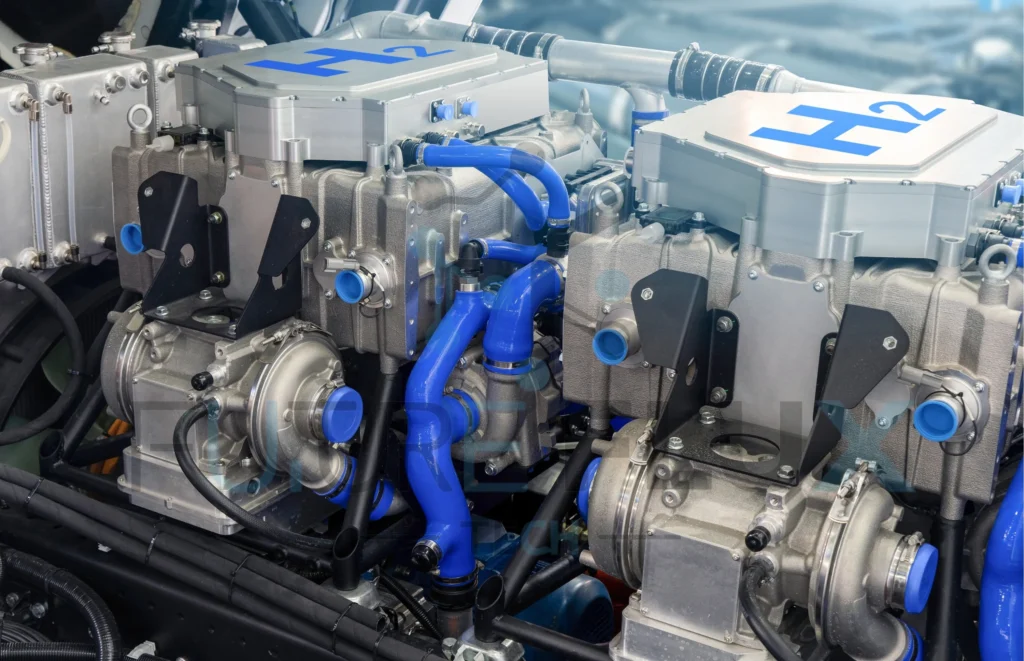Electric vehicles are a great hit in the world of cars. However, it may seem like hydrogen engines could be the next big thing in the automobile industry. While electric vehicles have been in the spotlight for zero-emission efforts, hydrogen-powered vehicles have been in the shadows. Electric vehicle companies focus on dominating the industry by 2030. But hydrogen engines have started to grab a share of this attention.
Although hydrogen vehicles are almost similar to electric vehicles, they come with an incredible feature called a hydrogen fuel cell. This feature helps the car to release only water vapours. Hence, these vehicles can be a great option to promote a sustainable and eco-friendly ride. For these reasons, there may be reports that BMW Says goodbye to electric cars in the near future.
BMW Says Goodbye to Electric Cars
In the coming future, the priority in the world of cars will be quick refuelling, fast performance, and eco-friendly options. Although EVs are very sustainable as compared to gas-fuel vehicles, they may still be improved. That is why there is a buzz in the market that BMW says goodbye to electric cars and plans to roll out hydrogen-powered cars.
These hydrogen engines can be a real game-changer by aligning sustainable energy priorities. Only a few manufacturers are actively working on this technology, and BMW is among them.
What is a Hydrogen Engine?

Hydrogen engines utilize hydrogen as a clean source to generate power. The hydrogen fuel-cell vehicles use the same motors that are found in an electric vehicle. However, they are not powered by heavy batteries but run on a stack of fuel cells. The hydrogen mixes with oxygen available in the environment and produces water vapour. All this ultimately generates electricity to promote these vehicles.
BMW iX5 Hydrogen
The BMW iX5 Hydrogen is one of the hydrogen-fueled vehicles coming in 2024 BMW dealerships. The sustainable SUV idea focuses on heading towards a new era of electric mobility by keeping overachieving performance in mind. For cities, countries, and companies to meet net-zero emissions in a few years, renewable energy sources are necessary. Hence, BMW says goodbye to electric cars to fulfil the demand for electrification. Hydrogen, in this way, can play a key role in the future.
Advantages of Hydrogen Engines
Hydrogen engines can provide many benefits in the upcoming days. Because of these benefits, BMW says goodbye to electric cars and may look forward to hydrogen engines. These advantages may include:
Lesser Greenhouse Gas Emissions: Since hydrogen engines generate water and heat as their primary byproducts, they produce far fewer greenhouse gas emissions than fossil fuel-based engines.
Enhanced Engine Efficiency: Hydrogen engines show higher energy conversion efficiency. Particularly, fuel cell engines show more efficiency than internal combustion engines. Because of this, the overall performance becomes better and contributes to lower fuel consumption.
Renewable Fuel Source: Hydrogen gas can be generated from different renewable sources. These may include water electrolysis, which makes it a good sustainable energy option.
Challenges and Limitations of Hydrogen Vehicles
Hydrogen engines such as BMW hydrogen engines have their advantages. However, they may also show some challenges and limitations.
1- High Investment
Developing and producing hydrogen engines can be a costly investment. It is specifically for fuel cell engines since it requires expensive materials such as platinum as a catalyst.
2- Limited Infrastructure
Hydrogen refuelling stations are very limited as compared to gas stations. Hence, it may make the vast adoption of hydrogen engines a bit more challenging.
3- Storage and Transportation
Hydrogen storage and transportation show critical obstacles. This is because of the need for cryogenic storage or high-pressure containers. Furthermore, it also has low energy density.
With continuous research and developments, the automobile industry is looking forward to removing these challenges and limitations. If these challenges are solved, hydrogen engines can play a huge role in maintaining a greener environment and global purity. BMW says goodbye to electric cars and is focusing more on hydrogen engines.
Future Prospects
The demand for sustainable and clean energy sources is increasing rapidly and is expected to grow more. That is why hydrogen engines have a high potential to play a significant role in obtaining this goal. Ongoing development efforts and research focus on improving the affordability, efficiency, and infrastructure of hydrogen engines. Hence, they may become more widespread and accessible shortly.
Features of BMW iX5 Hydrogen
| Features | BMW iX5 Hydrogen |
| Horsepower | 400+ |
| Refueling count | minimal |
| Range | Approx 313 miles |
| Fuel Technology | Fifth-generation fuel cell technology |
Want to know how electric vehicles work and how they promote a sustainable environment? Visit our website and read blogs like “Do electric cars have transmissions?” and more.
Conclusion
Hydrogen engines provide a promising alternative to traditional gas engines. They are likely to show a significant reduction in greenhouse gas emissions and dependence on fossil fuels. While there are challenges, continued advancements in hydrogen engine infrastructure and technology could establish a way for a more eco-friendly and sustainable future.
I’m Waqas, an electric vehicle enthusiast and tech writer with over 6 years of experience covering the EV industry. I write in-depth articles, comparisons, and reviews to help readers understand the fast-evolving world of electric mobility. From battery technology to EV launches and charging trends, I aim to make complex EV topics simple, engaging, and informative for everyday drivers and curious readers alike.





